

Quaker & Hindu Attitudes to Violence
Muslim & Pagan Attitudes to Violence
The Agreed Syllabus for RE in Leeds Schools
Faith, Refugees and Asylum Seekers
Faith Perspectives on Gender Issues
Concord's Annual Peace Service 2017
Islamophobia Awareness: Causes and Cures with MEND
Violence: Its Causes and Cures - Buddhist & Jewish Perspectives
Peace is a Process - Concord AGM 2018
Interfaith - A Beacon of Hope (The Peter Bell Memorial Lecture 2018)
What's the Point of Interfaith Dialogue?
Faith in Elderly People: The Leeds Experience
Joint Statement on Arson Attacks, June 2018
Baha'i Ethics in Contemporary Society
Shalom - Salaam at Concord's AGM 2017
The Workplace, Spirituality & Interfaith Dialogue
Brahma Kumari Ethics in Contemporary Society
Death & Beyond in Sikhism & Quakerism
The End of ISIL? - a Talk by Prof. Paul Rogers
16th July 2016 In Response to Military Intervention in Turkey - Statement from the Dialogue Society
Tributes to the Late Harbans Singh Sargoo(1941-2016)
Statement by Leeds Faiths Forum & Concord in Response to Paris Attacks
Statement by Leeds Faiths Forum & Concord on Refugees
Lord Singh delivered the Peter Bell Memorial Lecture at the Leeds Civic Hall in March 2015
We had a very rich and lively discussion in November at the Hindu Temple in the last of our series of meetings on Attitudes Towards Violence. In this case we heard about Quaker perspectives from John Margham and Hindu perspectives from Dr Shripati Upadhyaya. The amount of common ground between them was remarkable.
In September we had a session on Attitudes Towards Violence in Islam and Paganism at the Baab ul Ilm Islamic Centre. Left to right: Ustadh Adam Aslam, Jay Anderson, Idris Aslam and Gurmukh Singh Deagon
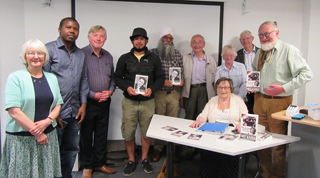 Some Concord members visited the new Holocaust Museum at Huddersfield University in August, where we heard the fascinating and moving testimony of Iby Knill, a member of Concord and Holocaust survivor.
Some Concord members visited the new Holocaust Museum at Huddersfield University in August, where we heard the fascinating and moving testimony of Iby Knill, a member of Concord and Holocaust survivor.
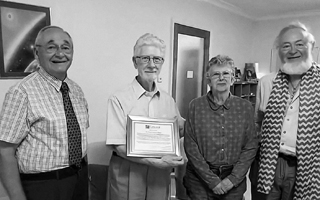 Concord made a presentation to the Revd Trevor Bates in July to mark his appointment as an Honorary Life Member of Concord. John Summerwill presented Trevor with a framed certificate signed by the Co-Chairs and Treasurer, with the following citation:
Concord made a presentation to the Revd Trevor Bates in July to mark his appointment as an Honorary Life Member of Concord. John Summerwill presented Trevor with a framed certificate signed by the Co-Chairs and Treasurer, with the following citation:
“This is to certify that The Revd Trevor S. Bates has been awarded HONORARY LIFE MEMBERSHIP of Concord in grateful recognition of his outstanding contribution to inter-faith relationships in Leeds and his unstintingly generous service to Concord, particularly as Chair (2008-2012), author of 28 profiles of members and interfaith leaders, promoter of the 40th Anniversary Celebrations, editor of A Leeds Interfaith Story 1946-2016 and gatherer of Concord archives. Presented to Trevor on behalf of the membership of Concord at The Brahma Kumari Adminstrative Centre, Leeds 16, on Wednesday 17th July 2019”
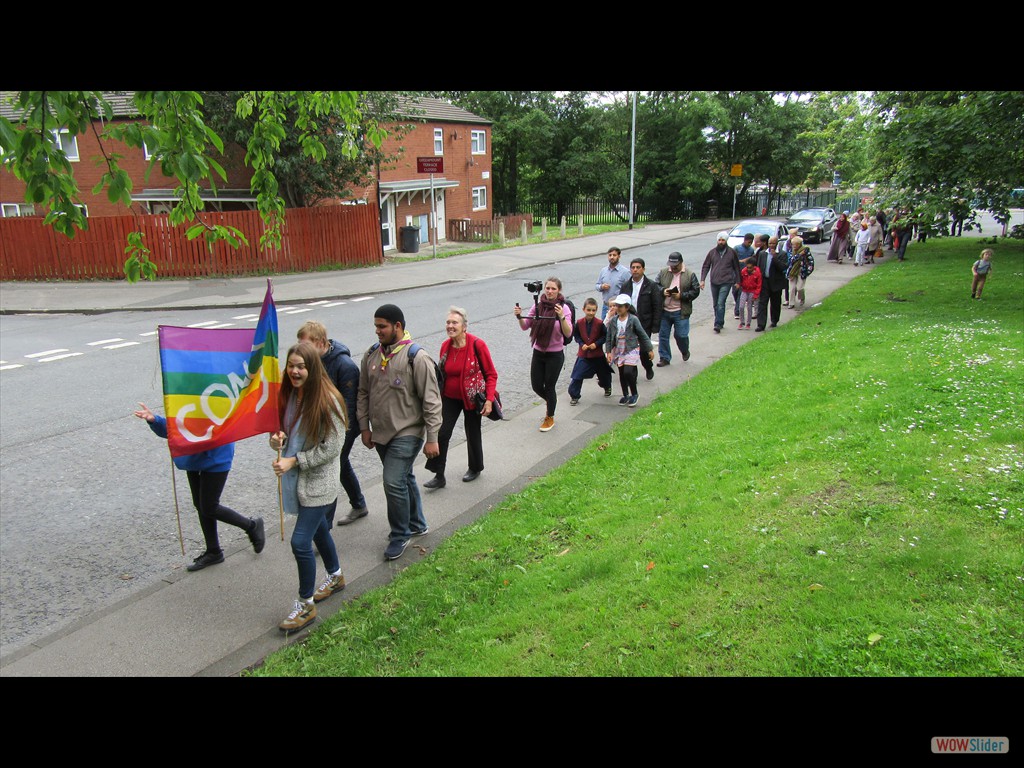 In June 2019 we had a very successful Walk of Friendship in Beeston, with over 100 people taking part. We had coffee at Beeston Hill United Free Church, lunch at the Guru Nanak Nishkam Sewak Jatha gurdwara, and cake at the new Abu Haraira Masjid.
In June 2019 we had a very successful Walk of Friendship in Beeston, with over 100 people taking part. We had coffee at Beeston Hill United Free Church, lunch at the Guru Nanak Nishkam Sewak Jatha gurdwara, and cake at the new Abu Haraira Masjid.
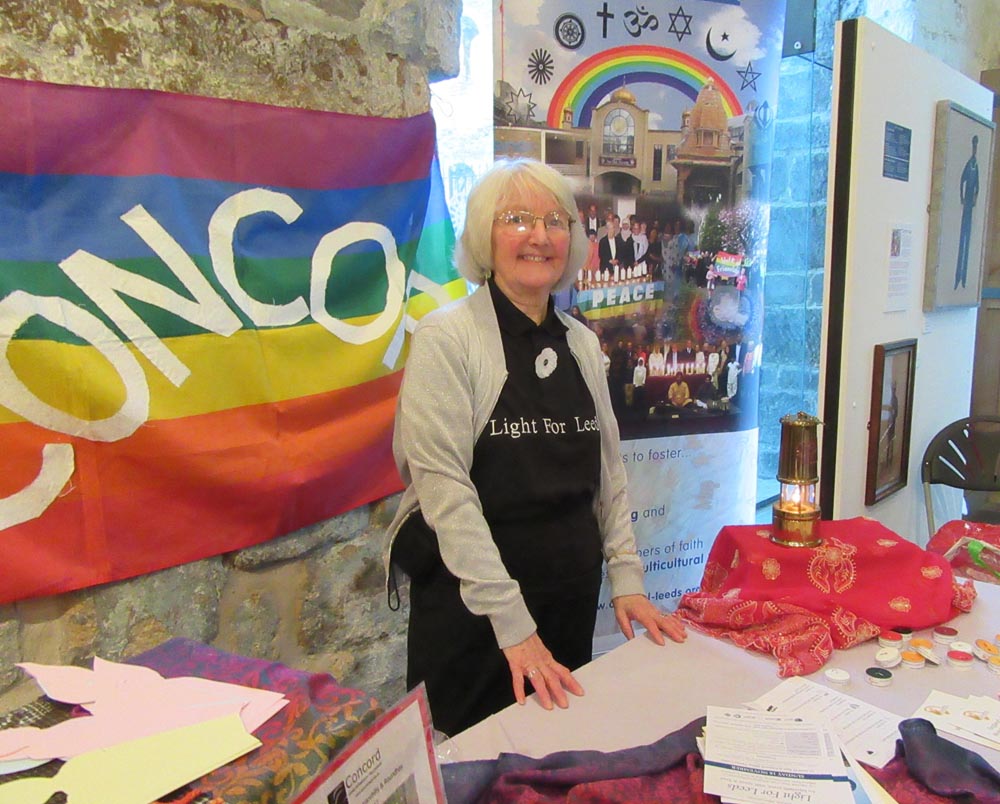 Light for Leeds 2018
Light for Leeds 2018Concord had a stall at the 'Light for Leeds' Interfaith Week Celebration on 18th November at the Visitor Centre, Kirkstall Abbey. Various stalls offered displays food and activities. Musical interludes, meditation walks, carol singing and a Faith in Peace and War display were part of the event. The pictures show Cynthia at our stall, the United Hebrew Congregation Choir, and a young imam reciting from the Qur'an.
On 18th July Concord members heard about the implementation of the Agreed Syllabus for RE in Leeds Schools. Alastair Ross, an independent advior to Leeds SACRE (Standing Advisory Council on RE) presented a detailed, coherent and thought provoking talk about the formulation and implementation of the the syallabus across Primary and Secondary Schools in Leeds.
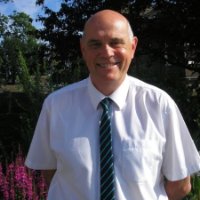
Alastair provided many examples of Schemes of Work, Lesson Plans and other documentary evidence that has been developed to assist with the implementation of the syllabus across all Key Stages. A lively question and answer session followed his main presentation.
Further information about the syllabus is available from Alastair Ross himself, via www.penninelearning.com, or from Leeds City Council at www.leeds.go.uk/docs/Leeds%20RE%20syllabus.pdf

On June 19th, Concord attendees participated in a meeting with a difference. Having been welcomed by Revd Dr David Randolph-Horn to All Hallows Church and given a short introductory talk about the Summer Solstice by Cyntia Dickinson, participants made their way to the Stone Spiral on Rosebank Road. There, those who wished participated in a Summer Solstice Ritual led by Jay Anderson, others preferred to watch.
The ritual followed a general pagan pattern, with the symbolic cleansing of the participants and the ritual space with salt-water and incense. This was followed by Jay, as Priestess, creating the sacred space with a large sword. The four quarters, represnting the four classical elements were called. Then the spirit of place, the ancestors and the Sun were similarly welcomed into the space. Tokens of the Sun, tealights and small packets of sunflower seeds were given to participants as emblems of the risen Sun, and whilst holding the lit tealights we meditated upon the flame as a divine spark whilst listening to Jay recite the Orphic Hymn "To the Sun".
The ritual ended with communal Cakes and Wine, and then closing the circle in reverse to how the ritual space had been created. The final ceremonial aspect saw Jay offer libations of cake and wine to the spirits of the place, by the stone of remembrance for those killed in Leeds during the air raids of World War Two.
After the event, David Commented that the ritual was full of connections - with the season, with the elements, with nature and with each other.
On 10th July, the Revd Dr David Randolph-Horn chaired the meeting looking at personal experiences of Refugees and Asylum Seekers. His introduction to the evening brought the work of AJAR (Asylum Justice and Release) to the attention of those present. Our first speaker was Ntambwe Nkomo (from the Democratic Republic of Congo (DRC)), who told his harrowing tale from university activist in his home country in the late 1990s, through his journey to England and the subsequent long drawn out process of seeking asylum, which even now is still ongoing! The second story was not of a first hand account from a refugee and asylum seeker, but from Ustadh Adam Aslam recounting the journey made by his grandfather from India in the late 1940s to the newly created Pakistan, and then onto England. Our final, short contribution came from Mustafah who is experiencing continued difficulties with the Home Office including them placing him in Leeds miles away from his friends and his support network in London. He is also awaiting their decision about his latest claim for asylum, following earlier claims being denied.
As is often the case, the contributions inspired some probing questions - of us, this time rather than our speakers. How do we respond to people with "bad attitudes" towards refugees and asylum seekers? How do we dispel the myths and give correct information? What was the purpose of this meeting? Are we just listening to stories, or are we prepared to help? Food for thought.
On 9th August, eleven members of Concord boarded a minibus for a visit to two of Sheffield's interfaith buildings, Burngreave Ashram and Shirley House.
At Burngreave Ashram we were welcomed by Revd Deacon Andrew Crowley of Sheffield Interfaith, Nirmal Fernando and the Revd Dr John Vincent. We were taken into their multifaith library in the basement, where we had tea, biscuits and a talk about the Ashram and it's wide variety of activities.
We then made our way across the city by minibus to Shirley House, on Psalter lane, next to St Andrew's, an Anglican-Methodist Church, where we were met by the Revd Gareth Jones, Caroline Cripps (Chair of the Shirley House Interfaith Centre), and several of the Christian, Jewish. Muslim and Pagan members.They talked about the diversity of faiths and faith buildings in the city, as well as the various events held at Shirley House. We were well fed with Pizza, salad and desserts before we headed back to Leeds.

September's meeting broke with tradition and brought together four speakers from our Executive Board to outline and discuss their varied faith perspectives on gender issues. Jay Anderson discussed the wide variety of pagan taditions, and how they may perceive gender issues across a wide spectrum, from traditional roles for the sexes, with binary opposition of gender, through to the more liberal traditions that atre fully inclusive of those who identify as LGBT+. Ustadh Adam Aslam acknowledged that the majority of Muslims hold traditional views about ther distinct roles for men and women. However, he went on to say that in universities the topic of sexuality is being hotly debated amonst Muslim students, and that there is room for a diversity of views on gender issues, where the scriptures are not always seen as absolute, and open for interpretation. Gurmukh Singh Deagon said that Sikhs do not talk about private sexual matters, so LGBT+ identities are not acknowledged, but that there should be respect and dignity for all. Dr David Goodman explored Brahma Kumari understandings of the relationship between the soul, which is genderless, and the body through which it has to function. When we get beyond gender we can be respectful of all gender differences and similarities and transcend them. The subsequent discussion covered a wide range of related, and pertinent topics. There was general agreement, by the end of the evening, that this session had been a good starting point for a bigger discussion that is needed, and to which we must return.
What one thing could you change in your life for peace?
Who would you be if you were working for peace?
These two questions were the challenge that students from Abbey Grange CE Academy put to themselves, to others in their school and to the people who came to Concord's Annual Peace Service in October.
The event was held in the Banqueting Hall of Leeds Civic Hall, in conjunction with the Leeds Peacelink Group, with their Chair, Cllr David Balckburn, making the keynote speech.
The full text of the service, including the passages read and the students' script can be found here.
On a cold and dark November night, Concord members and friends gathered together at the Quaker Meeting House on Woodhouse Lane to partake in a presentation on the causes of Islamophobia in the UK today and how we can respond to them efgfectively. The event was hosted by Ustadh Adam Aslam in conjunction with Shahab Adris, the Yorkshire and Humber Regional Manager for MEND (Muslim Engagement and Development).
There followed MEND's key multimedia presentation, which has so far been seen by approximatel 30,00 British Muslims and allies. This provided a great chance to discuss a pressing and sadly growing form of hate, alongside anti-semitism, whilst approaching solutions. Shahab then followed this up with a spoken presentation, highlighting three of the major causes of Islamophobia:
1. biased multi-media and negative portrayals of Muslims;
2. the notion that inadequate laws did not fully respect the core traditions of Muslims and created insecurity and demonisation of Muslims in the public sphere;
3. a lack of participation of communities of the faith, and also the wider community in their lack of understanding of Islam and the Muslim community
A discussion and presentation on the cures and responses to hate crimes then followed, looking at better reporting of all hate crimes, community engagement (both formal and informal), education, safe spaces and focusing on postive stories and their promotion. Many positive comments and questions followed, and much futher discussion was had, highlighting the postive contribution that Muslim communities have in the UK, economically and socially, and as a part of our city.
Further information about MEND and their resources can be found here.
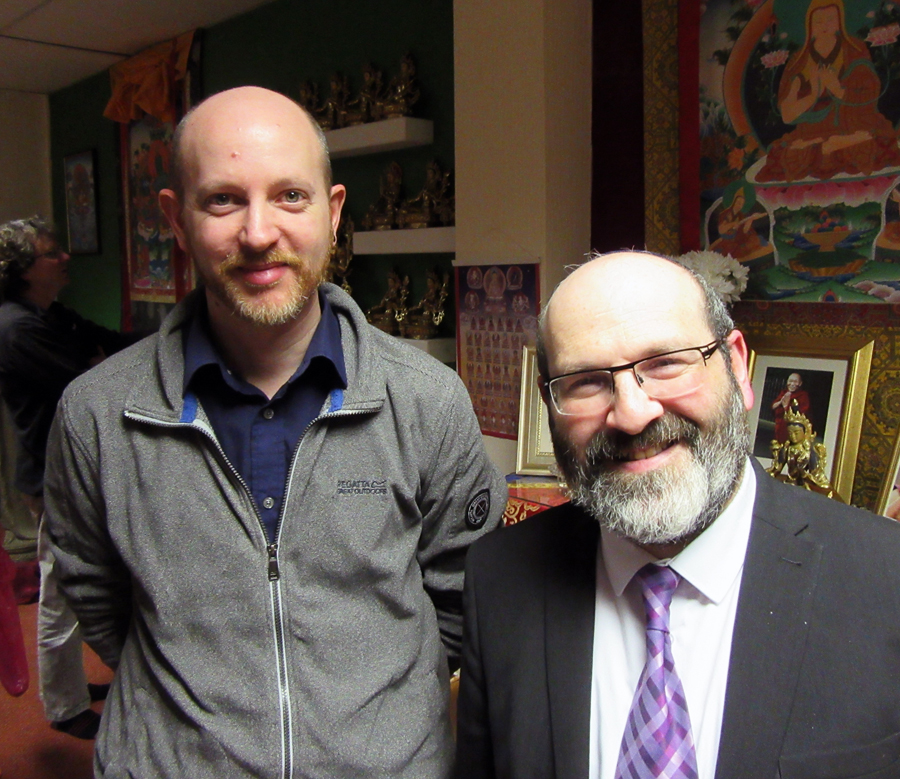
On Wednesday, January 24th, Concord members gathered at the Jamyang Buddhist Centre to hear a discussion led by Rabbi Jason Kleinman, of Beth Hamidrash Hagadol Synagogue, and Kerry Prest, Director of the Jamyang Centre, on Jewish and Buddhist Perspectives on Violence. This was the first in a new series of Concord meetings exploring dfferent faith perspectives on the subject of violence.
Rabbi Keinman highlighted the fact that humans are made in the image of God and are not born violent, but that as humans we are fallible, and that the "Yeszer Harah", the evil inclination, is a part of our nature, and that through religious practice and rituals we can each individually master and conquer it. There also exists the belief and practice of "Teshuvah", repentance, which gives the opportunity to turn over a new leaf and change.
Kerry Prest explained that Buddhism is about the mind, so that violence, in whatever form, is seen as an external manifestation of what is happening internally. Therefore, to address issues of violence, spiritual work in the form of meditation needs to be done on the mind.The ultimate aim of Buddhism is Enlightenment, in which there is no basis for pride or anger or negative thought.
Dennis Hallam, a Buddhist member of Concord now living in Chopwell, near Newcastle, has sent us copies of two pictures that he has composed, inspired by a recent guided visit at Durham Cathedral, centred on the Northern Saints. He has created them in the style of the Lindisfarne Gospels.
In order to see a more detailed image of each picture, please "ctrl+click" on each image to follow the hyperlinks to the full sized images.
On Wednesday 16th May, Concord held it's AGM, at the Leeds Museum Discovery Centre. Those who arrived early were able to partake of a tour of the storage facility, and have a glimpse of some of the items not on display presently across museums in Leeds. The AGM began promptly at 7.30pm, briskly taking care of the agenda items, with minor changes to the Principal Officers and Executive Board Members.

Lucy Moore, the World War One Projects Curator for Leeds City Council took us through a detailed and interesting Powerpoint Presentation on "Peace is a Process - the impact of the 1918 Armistice and how Leeds is commemorating this in 2018".
As the AGM coincided with the first day of the Muslim month of Ramadan, Lucy had a final treat instore for those of us present, we were able to view a piece of the covering from the Kaa'ba dating to 1917. Ustadh Adam Aslam then opened the month of Ramadan by reciting the traditional prayers.
On Wednesday 25th April, the Revd Dr Marcus Braybrooke, the President of the World Congress of Faiths, gave the Peter Bell Memorial Lecture, entitled "Interfaith - A Beacon of Hope".

After acknowledging the inspirational work of Concord's own Peter Bell, Marcus went on to discuss his involvement in Interfaith work, which paralleled that of Peter in many ways, and his involvement in a number of international interfaith efforts, including Religions for Peace, the United Relgions Initiative (URI), the Parliament of the World's Religions, and the International Peace Council.
The final part of his talk focused on how interfaith work has an important contribution to make towards "healing the past and creating a happier and more healthy future", through combatting ignorance, prejudice and seperatist ideology, and by being welcoming and open to those from paths not our own.
"All our faiths offer us hope for the future and perhaps hope is what we most need today. In the words of an old hymn, 'Earth shall be fair and all her people one.' This is why I believe the interfiath movement is a Beacon of Hope."
Concord's March meeting, led by Co-Chair John Summerwill, was very different from usual. Attendees were treated to a selection of videos to inform and inspire discussions around "What's the point of interfaith dialogue?"
The film clips varied from a black and white silent movie through to up-to-date documentaries to a compilation of world-leader statements. They included different types of dialogue - theological exchange, practical and social action as well as conversation.

After each short film we had a brief
discussion, not just about what we had seen but also its
relevance to us, in
Concord, and in Leeds. There were
some areas where it was felt that our activities had an
impact, such as the Peace Service, the Walk of Friendship,
and Women Peace-ing Together. However, it was felt that in other areas, e.g. involving
young people, we need to enhance our engagement.
Finally, there was a discussion about how to take things forward, with the suggestion of compiling a small, pocket-sized booklet to help others understand the purpose of Concord and the value of interfaith dialogue and interaction.
In February Concord members came together to listen to the Revd Dr Albert Jewell and the Revd Canon Alan Griggs talk about the history and purpose of "Faith in Elderly People" (FIEP).
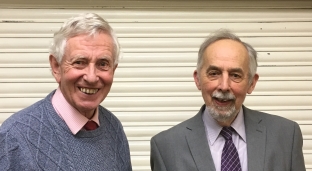
A lively and entertaining double act ensued, with Alan covering the history of FIEP; with its origins, the factors that led to its creation, going back to the 1960s when churches were seen to be doing a better job in providing for communities. He then tracked the changes through to the 1990s, with FIEP being founded in 1991, and subsequent developments, changing attitudes to the elderly, and project work instigated by FIEP.
Albert then gave us a short presentation on his personal involvement with FIEP, and their publications, readily available (and reasonably priced) from FIEP at www.fiep.org.uk, along with further details of their current activities and projects, as well as their contact details if you wish to get involved in their work.
As instruments of peace, members of Leeds Faith Forum and Concord Interfaith Fellowship stand shoulder to shoulder to condemn the senseless and cowardly arson attacks that were carried out on two places of worship in Leeds yesterday.
We stand in the light of goodness within each of us and show solidarity with our brothers and sisters from the Guru Nanak Nishkam Sewak Jatha Gurdwara and Jamia Masjid Abu Huraira Mosque. Both were the victims of hate crime.
We urge all communities to show hope where there is despair, light where there is darkness and love where there is hate. Only then can we show the true power of love because that binds us all together.
Our thoughts, prayers and solidarity go to the communities affected by this horrific hate crime.
Anyone requiring further advice and information on reporting hate crimes and security procedures for establishments can approach West Yorkshire Police on 101.
Further advice can also be found in the Interfaith Network’s document “Looking after one another: The safety and security of our faith communities”
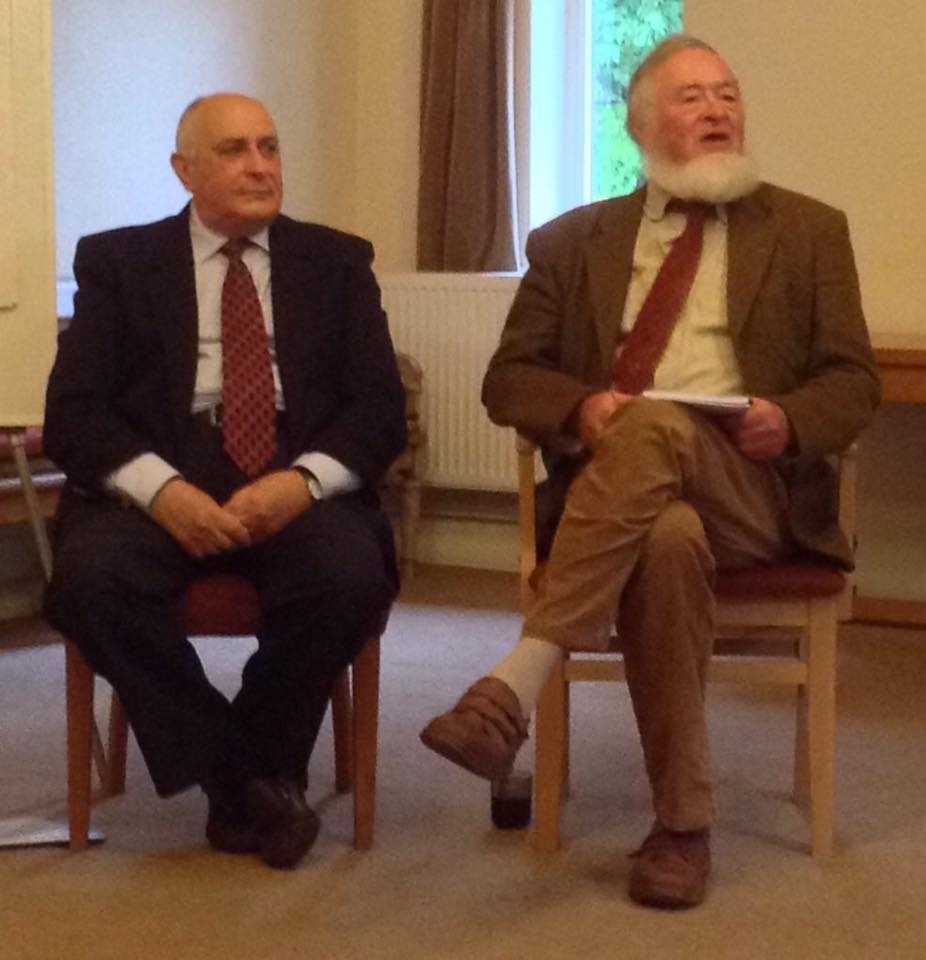
On 29th June, Dr Shahin Fatheazam spoke, to a packed meeting room of Concord members and guests, about Baha'i Ethics in Contemporary Society. An engaging presentation that led to lots of discussion in the subsequent Q&A, and during refreshments afterwards.
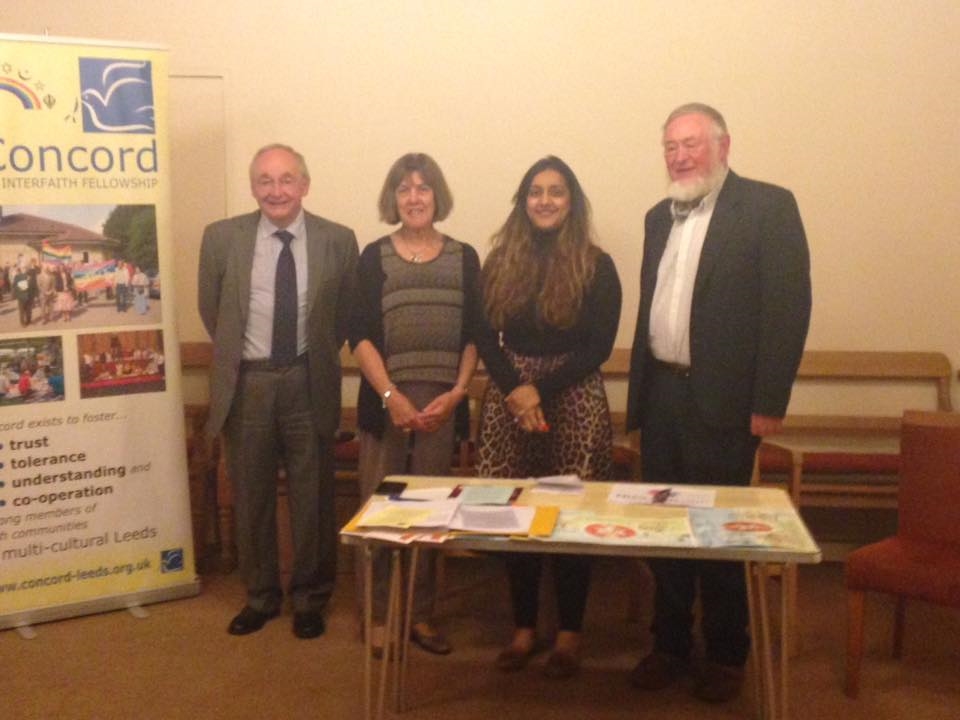 On 17th May once the formal matters
of the AGM were over, including re-election of the Executive
Board Members and minor amendments to the constitution, we
were joined by Hilary Curwen and Salma Arif of the Leeds
Branch of Nisa-Nashim (Jewish Muslim Womens Network) whose
talk "Shalom - Salaam" described the branch's formation and
the events and initiatives they have been privileged to
participate in since. They also looked to the future and
what increased dialogue and understanding between the two
faiths could mean, including the possibility of discussing
the "difficult" questions.
On 17th May once the formal matters
of the AGM were over, including re-election of the Executive
Board Members and minor amendments to the constitution, we
were joined by Hilary Curwen and Salma Arif of the Leeds
Branch of Nisa-Nashim (Jewish Muslim Womens Network) whose
talk "Shalom - Salaam" described the branch's formation and
the events and initiatives they have been privileged to
participate in since. They also looked to the future and
what increased dialogue and understanding between the two
faiths could mean, including the possibility of discussing
the "difficult" questions.
Dennis Hallam, a Buddhist member of Concord now living in Chopwell, near Newcastle, has sent us a copy of this picture that he has composed to give symbolic expression to the unity of faiths. The Latin title means ‘Holy rivers all flow into one sea of love.’
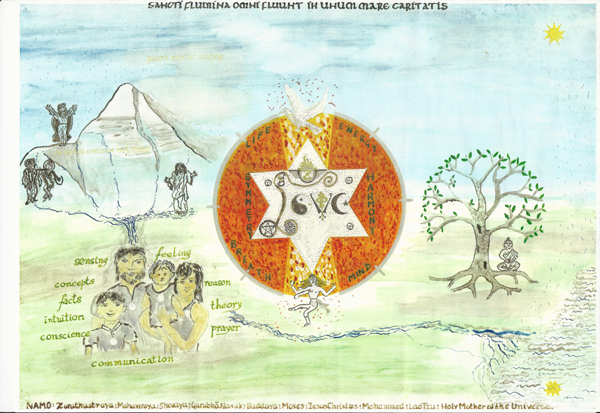
He explains the elements of the picture thus:
There is much food for thought in this image, which repays attention to its details. We are grateful to Dennis for making it available to us.
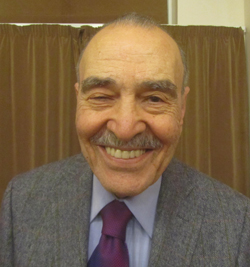 Dr Hamed Pakrooh died on Saturday 6th of May 2018 following a year long battle with cancer. He was a long term, highly respected, and very active member of Leeds Baha'i community representing the Faith in many capacities. He was a member of the Board of Leeds Faiths Forum, and Chair of Concord for four terms.
Dr Hamed Pakrooh died on Saturday 6th of May 2018 following a year long battle with cancer. He was a long term, highly respected, and very active member of Leeds Baha'i community representing the Faith in many capacities. He was a member of the Board of Leeds Faiths Forum, and Chair of Concord for four terms.
Special prayers were said for him and his family (his wife Farah, his daughters Azita and Mina, his son Ramin, his seven grandchildren, his two son-in-laws and his daughter-in-law) by Leeds Local Assembly.
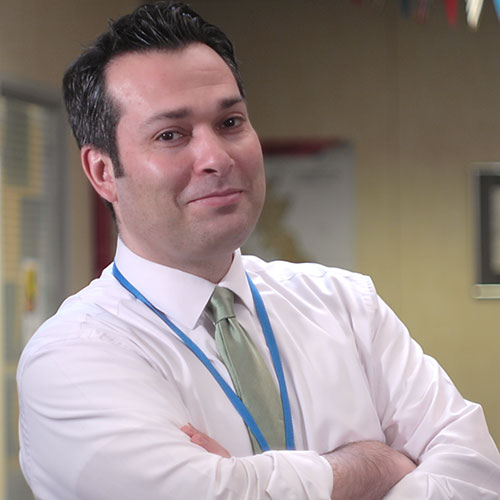 On 27th April, Concord Members were welcomed into Leeds
Language Academy to hear Dr Hakan Gok talk to us about
Muslim Life in Britain. "Ken", as he asked us to call him,
has an interesting, and maybe atypical, view of this topic,
as his background and upbringing are firmly rooted in his
former home countryof Turkey. In contrast, he believes
Muslim Life in Britain is good, and went on to detail why -
the things that we often take for granted, and can be often
heard to moan about, are the things that make his "new" home
country, Britain, good!
On 27th April, Concord Members were welcomed into Leeds
Language Academy to hear Dr Hakan Gok talk to us about
Muslim Life in Britain. "Ken", as he asked us to call him,
has an interesting, and maybe atypical, view of this topic,
as his background and upbringing are firmly rooted in his
former home countryof Turkey. In contrast, he believes
Muslim Life in Britain is good, and went on to detail why -
the things that we often take for granted, and can be often
heard to moan about, are the things that make his "new" home
country, Britain, good!
However, Muslim Life in Britain is not perfect, but it is better than some of the stories Ken shared with us about Muslims who are effectively trapped and detained in Turkey for having views that do not follow those of the ruling party. The audience raised a number of stories where Muslim Life in Britain was far from perfect, specifically the increase instances of Islamophobia post-Brexit Referendum. Ken asked us to strive towards tackling these issues head on and improving Britain even further by "doing our bit" to bring knowledge, awareness and understanding to the authorities and politicians in order to make "our country" even better.
This was another departure for Concord with a focus very different from our normal meetings. A thought provoking evening, that will hopefully have attendees reaching for their pens.
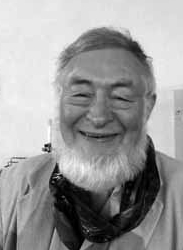 In
March, Concord members were welcomed into All Hallows Church
in Hyde Park to hear the Revd Dr David Randolph Horn discuss
his PhD research, "Spirituality at Work, an Inter Religious
Perspective".
In
March, Concord members were welcomed into All Hallows Church
in Hyde Park to hear the Revd Dr David Randolph Horn discuss
his PhD research, "Spirituality at Work, an Inter Religious
Perspective".
David's research was hinged on the fact that the 2011 census showed that the number of religious adherents had fallen to about half of the population, so what about the other half? His research explored spirituality as something that both religious and non-religious individuals experience, and how this impacts upon their daily life, their behaviours and values, including in their place of work.
David endeavoured to let the research participants define what they meant by the term Spirituality rather than impose definitions, especially when it is notoriously difficult to define, and means different things to different people.
Attendance was varied, reflecting the variety of individuals interested in David's research. An absorbing and stimulating evening was had by all.
Brahma Kumari Ethics in Contemporary Society
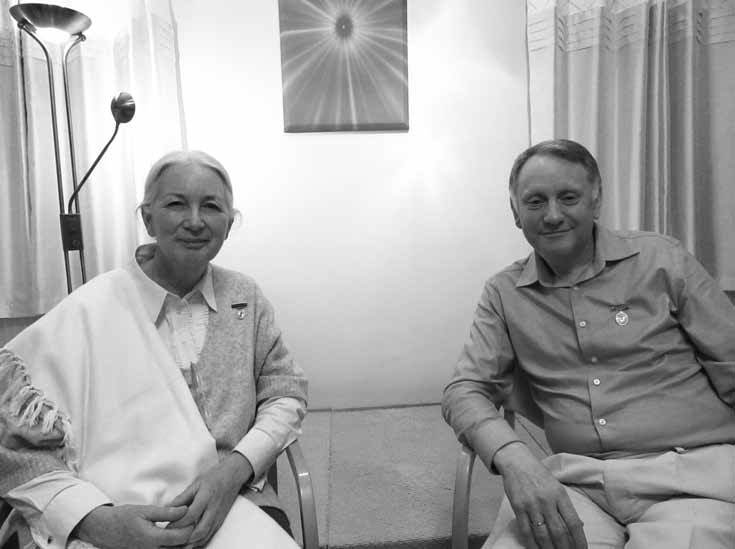 On 21st February members of Concord were welcomed into the
Brahma Kumari Centre Centre on Otley Road to listen to Dr
David Goodman speak about Ethics in Contemporary Society
from a Brahma Kumari perspective. With the help of Jane Kay,
a fellow Brahma Kumari, asking thoughtful questions of him,
David discussed how Brahma Kumaris aim to embody their
ethics, the virtues that all should aspire to when "in a
relationship" with divinity, be they Brahma Kumaris or not.
He also noted how contemporary society has distracted us
from being virtuous, and from being ethical.
On 21st February members of Concord were welcomed into the
Brahma Kumari Centre Centre on Otley Road to listen to Dr
David Goodman speak about Ethics in Contemporary Society
from a Brahma Kumari perspective. With the help of Jane Kay,
a fellow Brahma Kumari, asking thoughtful questions of him,
David discussed how Brahma Kumaris aim to embody their
ethics, the virtues that all should aspire to when "in a
relationship" with divinity, be they Brahma Kumaris or not.
He also noted how contemporary society has distracted us
from being virtuous, and from being ethical.
Jane brought the meeting too a close with a recitation of the "Paradoxical Commandments", as found on the wall of Shishu Bhavan, Mother Teresa's children's home in Calcutta.
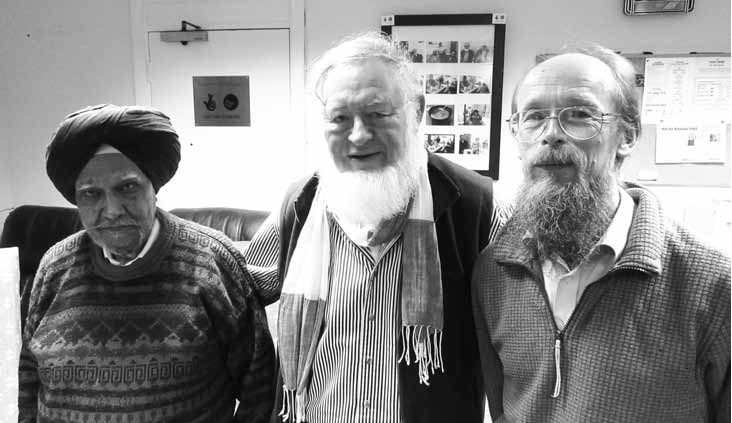
On 16th January, Concord members and guests met with Professor Bakshish Singh (Sikh - Left) and Robert Keeble (Quaker - Right) to discuss Death and Beyond from the perspectives of Sikhism and Quakerism, at the Sikh Temple on Chapeltown Road. This meeting was probably the largest we've seen for an "ordinary" Concord meeting.
Robert, a life-long Quaker and Elder from the Carlton Hill Meeting House, gave the Friends' perspective - where there is no set doctrine on death, but by considering death people can live life to the full. Similarly, there are no set funeral services but Friends try to meet the wishes of the bereaved family. This often goes above and beyond the Quaker tradition of shared silence, with a memorial meeting where the life of the deceased is celebrated. Cremation is now the norm, but there are three Quaker burial grounds in Leeds.
Professor Singh referred to the sikh scriptures, the Guru Granth Sahib, which explain the law of karma, reincarnation, and transmigration of the soul towards union with God. Funeral Services can vary, but cremation is the accepted tradition, with the ashes being scattered into flowing water. There are usually eight days of prayers for the deceased, and for visitis from friends and family.
On Monday 14th November 2016, Paul Rogers,
Emeritus Professor of Peace Studies at the University of
Bradford presented a packed Quaker Meeting House, with his
view of "The End of ISIL?". He presented an in depth
and knowledgeable assessment of what led to the creation of
ISIL, their impact, and a future where "attacks from the
margins" of society are more likely as we come to terms with
the increased marginalisation of individuals, climate
change, population growth and scarcity of resources. A truly
thought provoking talk for all who attended.
On the evening of Wednesday 26th October, individuals from all across Leeds gathered together in the Banqueting Room of the Civic Hall for Concord's Annual Peace Service. Participants offered prayers, readings and music, alongside the lighting of candles by members of the major faith groups in Leeds, for Peace.
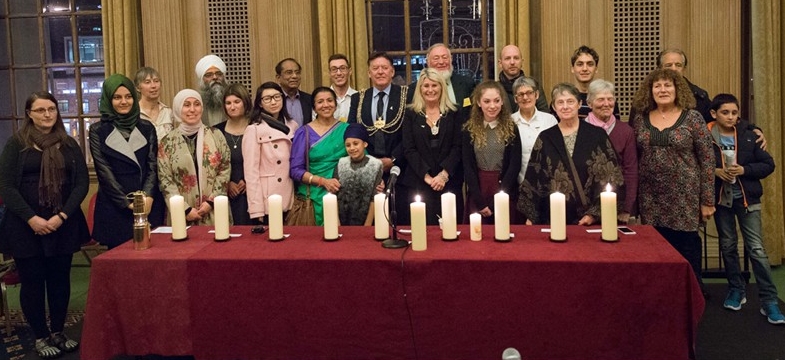
The Lord Mayor, Councillor Gerry Harper, and Lady Mayoress, Lynne Scholes, gave a reading and lit the central candle of the display on behalf of all the people of Leeds.
Further photographs from the event, courtesy of Steve Evans, can be viewed here, as can the Programme and the Readings.
On the evening of Thursday 11th August, Concord Interfaith fellowship, along with friends old and new, celebrated its 40th Anniversary with a celebratory dinner at the GNNSJ Gurdwara in Beeston. Attendees were welcomed by the new Jathedar, Pritpal Singh Dhanjal, and the guest speaker for the evening, John Battle, former MP for Leeds West.
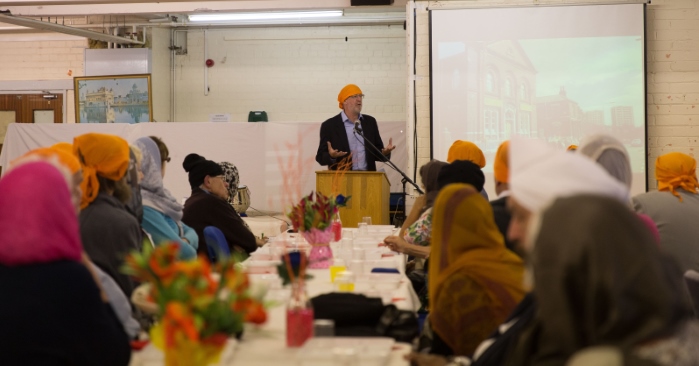
Further photographs from the event can be viewed here.
On Saturday 9th July, Concord Interfaith Fellowship and friends were joined by Councillor David Blackburn of Leeds Peacelink on the Annual Walk of Friendship, around the Burley/Hyde Park Area of Leeds.On Saturday 9th July, Concord Interfaith Fellowship and friends were joined by Councillor David Blackburn of Leeds Peacelink on the Annual Walk of Friendship, around the Burley/Hyde Park Area of Leeds.
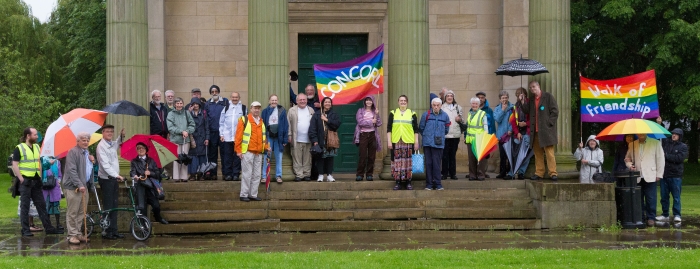
Starting at the Quaker Meeting House on Woodhouse Lane, we took a wet walk through the University, visiting St George's Field cemetery, and across Woodhouse Moor to Hyde Park Terrace and St Augustine's Church, Wrangthorn. After that, the weather picked up and we made our way down Hyde Park Terrace, Midland Road and Brudenell Road, where we were subsequently welcomed into the Makkah Masjid (Mosque). Finally we made our way to the Hindu Mandir (Temple) on Alexandra Road, via Thornville Road.
The photographs from this year's walk can be viewed here.
News of this year's Walk even made it into the Yorkshire
Evening Post. The article can be viewed here
On July 15, Friday, Turkey witnessed a coup attempt by sections of the military, which has left dozens dead and injured. The attempt has been successfully put down and the government is back in control of the country. At the Dialogue Society, we condemn, in the strongest terms, the attempted military coup in Turkey and reiterate that there is no place for military interventions in democracy.
Turkey has long suffered from the anti-democratic reflex of the military. The achievement of free and fair elections where governments are accountable to the public and power changes hands through the ballot box has been Turkey’s most valuable achievement, which should be protected and cherished at all time.
While admitting the scarcity of information at the early hours of the night, President Erdogan and figures close to him were quick to lay blame on the Hizmet movement. This is a predictable pattern, as Erdogan blames almost all oppositional development in Turkey on Hizmet as a pretext to purge state and civil society. Gulen issued a statement early in the night condemning this coup in the strongest terms, adding “[a]s someone who suffered under multiple military coups during the past five decades, it is especially insulting to be accused of having any link to such an attempt. I categorically deny such accusations.” Leading Hizmet NGOs in Turkey and abroad also issued condemnatory statements last night. Hizmet participants have consistently demonstrated categorical condemnation of such anti-democratic practices and showed strong commitment to the rule of law and functioning democracy. Both Fethullah Gülen’s teachings and the Hizmet participants’ works around the world on dialogue, democratic engagement, active citizenship and social cohesion is the embodiment of this commitment.
We hope those accused with trying to overthrow the government will be tried in courts of law and this incident becomes a source of motivation for strengthening Turkey’s democracy. We are particularly concerned that Turkey’s domestic troubles are used as a source of polarisation of the Turkish-speaking communities overseas and have already received reports from members of hate crime originating out of the UK. We encourage anyone who witnesses hate crime to report it to the police immediately.
Our neighbour France has again suffered an atrocity which leaves in its wake dozens dead and injured and a community and country in mourning. Our thoughts and prayers are with all affected by this cowardly and horrendous attack.
Such attacks are designed to rupture the fabric of civil society - not just in France but throughout Europe and beyond: to create suspicion, fear and hatred.
It is vital that in the UK we continue to work for a society which is marked by commitment to tackle tough issues with honesty and constructiveness and to work peacefully to resolve disagreement. Extreme voices and actions have no part in this.
Communities will, and must, continue to reject and stand against brutal violence where it is claimed by perpetrators to be in the name of their religion.
It is vital, too, that we support communities that may be rendered vulnerable by events overseas or at home. There must be no room for prejudice which singles out any community because of criminal actions carried out by a few in the name of its religion.
Our thoughts turn back to France and indeed to all countries around the world affected by terrorism. In the UK, many will be holding vigils and times of prayer. We join our prayers to theirs.
On Friday, the results of the European Union Referendum were announced. The UK has voted, by a majority of overall numbers of votes cast, to leave the European Union.
There are rapidly moving discussions and strongly held views on the issue.
An immediate need is extending support to those who have been targeted with abuse in the wake of the vote, including some members of the Polish community and also people from other ethnicities and of a number of faiths, including Muslim and Sikh. This abuse and hostility is entirely at odds with the values of tolerance, valuing of diversity, and mutual respect. IFN’s member bodies, like many others around the UK, will no doubt be finding ways to reach out and to be supportive at this difficult time.
We are entering a period when the need for bridge building within society will be more important than ever. Faith and inter faith organisations have an extremely important role to play in this as well as in contributing to the debate about future identity of the UK.
Religious freedom is an increasingly significant issue for the UK, as for other countries around the world.
The eve of the Easter Bank Holiday weekend saw the murder of a shopkeeper in Glasgow, Asad Shah from the Ahmaddiya Muslim Community, which police have said appears linked to his religious beliefs as expressed on social media in Easter greetings to customers.
Glasgow’s community has stood together in the face of that attack, rallying through the #thatisnotwhoweare campaign. The murder, by a Muslim, has been described as sectarian. It has been condemned by bodies such as the Muslim Council of Britain and others.
National faith communities in the UK seek to respond to incidents here and also to support those around the world whose religious freedom is truncated, often brutally, including through murders and terrorist attacks, such as, most recently, the appalling Easter day attacks in Lahore, and atrocities in other parts of the world. Attacks on, or intimidation of, groups and individuals of other beliefs is an extreme form of restriction of the religious freedom of others. We deplore these in the strongest terms. A number of Inter Faith Network for the UK member inter faith bodies have as a key aim the raising of awareness of the importance of religious freedom. All the member bodies of the Inter Faith Network for the UK, through their work to promote inter faith understanding and cooperation, make an important contribution to that.
One of the key principles of the Inter Faith Network is of respecting other people’s freedom within the law to express their beliefs and convictions http://www.interfaith.org.uk/code We must be free to disagree, including in relation to matters of religious belief, but, as the Inter Faith Network code also says, we should work to prevent disagreement leading to conflict and to avoid violence in our relationships. Let us stand firm by these values, speak out against extreme voices and violent actions, encouraging education and dialogue, and working together on the basis of our common values for increased understanding, cooperation and harmonious coexistence.
We regret to have to report the death in January of Harbans Singh Sagoo, one of the most outstanding leaders of interfaith dialogue in Leeds and a good friend to Concord.
Jocelyn Brookes, the Secretary of the Leeds Faiths Forum, of which Harbans was at one time Chair, said of him:
“Harbans was a very generous and spiritual man who loved God and his fellow human beings. He worked tirelessly for God through his commitment to his faith and to his Gurdwara as well as through his inter faith work and his massive contribution to the City of Leeds. He will be greatly missed by so very many people from all walks of life but we can feel privileged that his life touched ours and that we are better people because of that.
Harbans is safe in the love of God and we extend our sincere condolences to his family in their great loss.”
At his funeral on the 13th January Canon Charles Dobbin, Chair of the Leeds Faiths Forum, gave the following address:
I am honoured to be asked to speak today about Harbans, a noble man of immense stature, a man whose faith inspired and shone through all he did.
In 1973 Harbans with his family left Nairobi and his work in air traffic control to start a new life in Leeds. But more than succeeding in this, he went on to become a major influence for good, and a major influence in creating the degree of understanding between faiths that exists here today.
He has told me himself how criticism and mockery of Sikh customs and dress impelled him to speak about Sikhism in schools, and meet hostile reaction with truth, courtesy and information. He won the day. This characterised his many appearances in schools, organizations, inter faith Question Time sessions with Sixth Formers and other places.
Harbans worked tirelessly in inter faith dialogue and cooperation, being a member of Concord until 1982. This work, primarily of dialogue, was complemented by his involvement of Leeds Faiths Forum working more with the Council, and then in the very effective Yorkshire and Humber Faiths Forum. Along with this came inter faith work on an international scale, involving meetings with the heads of faith communities across the world.
I knew Harbans in Leeds Faiths Forum. He was Chair before me, a giant to follow — a giant because he had developed the relationship with the City Council through the Equalities Assembly with which he worked tirelessly, and also with Voluntary Action Leeds. But above all he was a giant because he was a man of shining integrity, goodness, interest and love. His faith and love were a light; they were water in a thirsty land.
He was the person who had the idea for the current Faith and Public Health Network being set up by Leeds Faiths Forum along with the Leeds University and the Director of Public Health, whereby health professionals can come to faith communities and give information about health issues in a context where people feel safe. That was the beginning. A few weeks ago I visited Harbans here at the Gurdwara to discuss how things could go forward. He had invited people who work in the community in Chapeltown. They argued how local communities and faith groups could work from the bottom to effect much health care, information and preventative care. Harbans had a vision for people being enabled. That meeting has transformed the way we are moving forward with the health project.
Harbans’ imagination was endless. So were his contacts. Was there anyone whom Harbans, through friends and relations, did not know? Perhaps it was understandable that we just happened to have the use and full cooperation of Leeds Met (as it was then) for the inter faith environment conference. But when I told him that I was going to India to lead a retreat, and would like to visit Amritsar while I was there, he introduced me to the man in charge of the restoration of the Golden Temple to have a personal guide to what was going on and being achieved.
Harbans’ thought could reach high, but he could get his hands dirty. After the Environment Conference we put talk into
practice by taking part in a Clean Up project with Groundworks in various parts of Leeds. Harbans led the way in high viz jacket with bin bag and saw in hand. And no personal visit to Harbans’ home was complete without a visit to the garden and explanation about the way he was developing it, the fruit trees representing family members, the vegetable garden that was his passion.
So what does all this say?
Harbans had a continuing burning interest in what helps the community.
He had his maker’s love of creation
He was humble and loving head of a family
He had faith that turns ambition to succeed, into the power to shape the community for good,
to enable people to take responsibility for their own lives and communities.
He had faith that drew people to God from whichever tradition they may have started,
faith that was so transparent to God that he became the means of God being present among us.
We at Leeds Faiths Forum, which represents nine Faiths in Leeds, stand alongside the people of Paris at this time and offer our deepest sympathy to them, especially those injured and bereaved through the extremist attacks on Friday. We are joined by Concord, also involving a large number of people of different faiths in Leeds, who wish to be fully associated with this statement.
We are appalled at Friday’s extremist attacks in Pais on innocent people. In their cruelty, undiscriminating hate and resort to violence rather than dialogue, we see these attacks as completely contradicting the fundamental humane and moral values that are taught by all faiths, including Islam.
We particularly stand in solidarity with the Muslim community, the vast majority of whom wish to work for peace and to live by the values of truth, compassion, mercy and obedience to God, and who have stated publicly their revulsion at Friday’s atrocity. As they face increased vulnerability and wrestle with these stresses in their community, we see them as our brothers and sisters and are deeply distressed on their behalf.
We perceive ISIS to be seeking their ends by creating a climate of fear and fostering division in our society. They are fighting a subversive battle within our minds and in our community in an attempt to create conditions for their distorted version of Islam to flourish. We believe that the wider community must not let itself become fertile ground for seeds of division and fear to grow. This is what gives urgency to the dialogue and cooperation between faiths that so many of us are engaged in.
The Rev’d Canon Charles Dobbin MBE, Chair, Leeds Faiths Forum (m07753359766)
Dr Simon Phillips, Chair of Concord Interfaith Fellowship
16.11.15
While many faith communities and organizations have given their individual view of the Refugee crisis, inter faith organizations Leeds Faiths Forum and Concord, both dedicated to developing inter faith dialogue and cooperation, also collectively wish to support all that is being done to welcome and help refugees, and to emphasise two points:
Firstly there is a strong tradition of the United Kingdom receiving refugees, of which many of us are personally the beneficiaries. Such hospitality is part of our religious duty. Without refugees entering our country throughout our history, we would not have the strengths we have today. We are only too aware that to support help for refugees means being prepared to take direct action personally.
Secondly, the Multi Faith service at Leeds Minster on 13 September made it very clear that the refugee crisis is only one of a number of issues where the different Faiths are inescapably involved together by belief and by circumstances. We are only too aware of the fears that some in our society have of immigration and of the divisive effect this could have. This means we can no longer see inter faith cooperation as an optional extra, but must harness the power of Faith to transform our world for the better, and must not allow ourselves simply to be seen as the cause of division and violence. Along with the practical help given, a cooperative approach of the different Faiths is in itself a contribution to addressing the problem.
The Rev'd Canon Charles Dobbin MBE, Chair of Leeds Faiths Forum
Dr Simon Phillips, Chair of Concord
29.9.15
Jaskiran Kaur Mehmi, Lord Indarjit Singh and Dr Simon Phillips (click on the picture to enlarge it)
Copyright ©2018 Concord (Leeds
Registered Charity No.: 516339